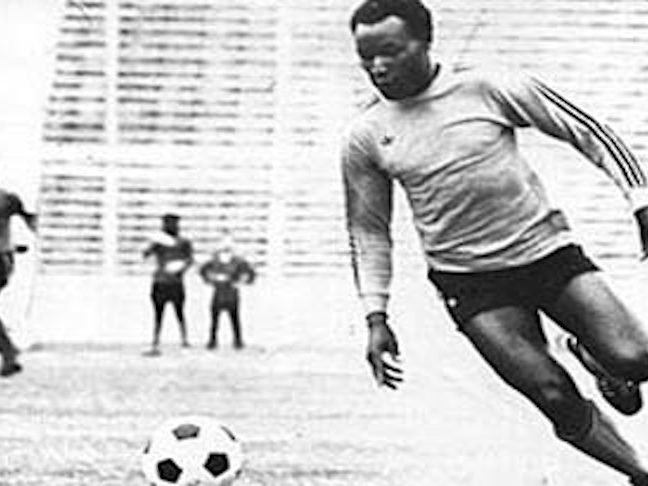
Africa’s Undisputed Goal King (Part Eighteen) The Decline and Fall of Africa’s Finest
December 27, 2020
Africa’s Undisputed Goal King (Part Twenty) Flawed Basis
December 27, 2020By Satish Sekar © Satish Sekar (May 13th 2020)
Bad to Worse
The APotY vote of 1972 was bizarre to put it mildly. Both exclusions and omissions were difficult to fathom. It was criticised as favouring Francophone countries, and where Anglophone nations were represented, it mirrored Arabic speaking nations. Reputations seemed to matter more than performance.
Hani Moustafa and Miloud Hadefi illustrate that graphically. But there were others too. Despite losing in 1970 Ghana had set a still unequalled AFCON record. They remain the only nation to reach four consecutive AFCON finals. But 1972 broke the mould for them. For the first time in a decade the Black Stars not only failed to reach the final, they failed to qualify for the AFCON Finals.
After a walk over in the first round of qualification caused by the withdrawal of Upper Volta (now Burkina Faso), the second round of AFCON qualifiers produced a huge shock. After drawing 0-0 in Lomé, a week later, Togo inflicted one of the biggest surprises in AFCON history.
The African Team of the 1960s, Ghana’s Black Stars were dumped them out of the competition 1-0 at the Accra Sports Stadium on June 20th 1971. The football doldrums awaited the African Team of the 1960s. After beating Sénégal 5-3 on penalties following a 4-4 draw on aggregate, the Black Stars faced the Elephants in the second round of qualifiers for the 1974 AFCON. They lost 4-0 on aggregate to la Côte d’Ivoire, losing home and away, thereby missing their second AFCON in a row.
It became an unwanted hat-trick of failure to qualify in 1976. After beating Mali 5-3 on aggregate in the fist round, the Black Stars were once again eliminated in the second round. They shared the spoils with Morocco’s Atlas Lions – both winning 2-0 at home. Morocco won 6-5 on penalties.
The Black Stars qualified as hosts in 1978 and made the most of the opportunity as they hosted and won for the second time in 1978. The Black Stars won the title for the third time and became the first team to keep an AFCON trophy.
In the absence of the Black Stars, an even bigger surprise would distinguish the eighth AFCON. Cameroon hosted their first, and to date, only, AFCON Finals in 1972. But it would be deemed a failure. The Indomitable Lions remain by far the most successful team never to have won AFCON at home.
A Different Story
While 1972 marked a new depth for the Black Stars as it was the first time they deservedly failed to qualify on the pitch, the clubs told another story. No Ghanaian team ever won the Cup Winners’ Cup. The closest was Asante Kotoko losing to Wydad Casablanca in the final in 2002.
In the CAF Cup – the African equivalent of the UEFA Cup – Ghanaian clubs performed even worse. No Ghanaian club reached the final, let alone won it. In 2004 both competitions merged to form the Confederation Cup. Ghanaian clubs did better. The inaugural final of the Confederation Cup resulted in Accra’s Hearts of Oak beat Asante Kotoko 8-7 on penalties after 1-1 draws. Hearts of Oak beat Zamalek to win the CAF Supercup in 2001 and lost to Enyimba in 2005.
The earlier days of the premier club competition the African Cup of Champions Clubs bore happier times for Ghanaian football. Kotoko lost to TP Engelbert (Mazembe now) in 1967 in weird circumstances. They took revenge in 1970 with a 3-2 win on aggregate.
Kotoko lost in the final to Canon Yaoundé and to AS Vita in 1971 and ’73 respectively. Their rivals Hearts of Oak lost to Guinea’s Hafia 4-2 on aggregate in 1977.
By their high standards Ghanaian football had entered a downturn in the 1970s, 1972 especially, but that was no reflected in the APotY vote.
The Black Star
Despite their absence from AFCON and failure of their representative to win the African Cup of Champion Clubs, Ghana was represented in the 1972 APotY vote, but the choice of player was odd – very odd.
Malik Jabir was undoubtedly a great player – his record speaks for itself, but what had he done in 1972, especially compared to Chitalu? Jabir won Ghana’s league with Asante Kotoko, but Hearts of Oak played in the African Cup of Champions Clubs.
Meanwhile, Chitalu had won five trophies with Kabwe Warriors and he was the top-scorer in the African Cup of Champions Clubs. He had also set two African Cup of Champions Clubs records and two World Records in 1972. What had Jabir done in 1972 to compare to that?
He was part of the Africa team that competed in Brasil’s Independence Cup. Jabir started in three of the four matches, coming on from the bench in the other. But, so what?
Jabir was in Ghana’s squad for the Olympic Games too, but the Black Stars’ performance was utterly dismal – played three, lost three, one goal scored and 11 conceded. It was the worst performance of any of the sixteen teams that played in the first round.
And Africa’s performance in Brasil’s Independence Cup was nothing to boast of either. So, what made Jabir the seventh best African player in 1972?


